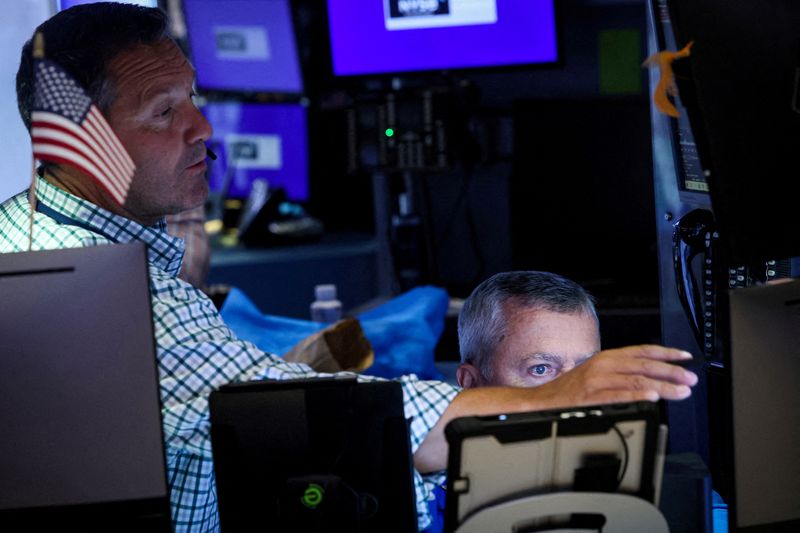By Caroline Valetkevitch
NEW YORK (Reuters) -U.S. stocks ended with steep losses on Monday, leaving the Nasdaq and S&P 500 down at least 3% each as the market extended last week's sell-off amid U.S. recession worries and as Apple shares (NASDAQ:AAPL) fell sharply on news that a big investor had cut its stake.
All three major indexes registered their biggest three-day percentage declines since June 2022, and the Nasdaq and S&P 500 closed at their lowest levels since early May.
The recession fears shook global markets and drove investors out of risky assets following weak economic data last week, including Friday's soft U.S. payrolls report.
Investors worry that the economy is losing steam more rapidly than anticipated and that the Federal Reserve erred by keeping interest rates steady at its last policy meeting.
Shares of Apple fell 4.8% after Berkshire Hathaway (NYSE:BRKa) halved its stake in the iPhone maker. Billionaire investor Warren Buffett also let cash at Berkshire soar to $277 billion.
Nvidia, Microsoft (NASDAQ:MSFT) and Alphabet (NASDAQ:GOOGL) also slid, while the Cboe Volatility index, Wall Street's "fear gauge," had its highest close since Oct. 28, 2020. All 11 of the S&P 500 sectors fell, led by declines in technology.
Chicago Fed President Austan Goolsbee downplayed recession fears, but said Fed officials need to be cognizant of changes in the environment to avoid being too restrictive with interest rates.
"Today we're seeing a sell-off as an extension of that anxiety that was felt last week," said Neville Javeri, portfolio manager and head of the Empiric LT Equity team at Allspring in Washington.
It "started off with the jobs data last week, and it clearly led to the belief that the Fed needs to start being more proactive around where those unemployment numbers are going," he said.
The Dow Jones Industrial Average fell 1,033.99 points, or 2.6%, to 38,703.27, the S&P 500 lost 160.23 points, or 3.00%, to 5,186.33 and the Nasdaq Composite dropped 576.08 points, or 3.43%, to 16,200.08.
The S&P 500 was down more than 4% at its lowest level of the session, 5,119.26.
Indexes trimmed losses in late morning after data showed U.S. services sector activity in July rebounded from a four-year low amid a rise in orders and employment.
The weak jobs report and shrinking manufacturing activity in the world's largest economy added to worries following recent disappointing forecasts from the big U.S. technology companies. The Nasdaq Composite on Friday confirmed it was in correction territory.
Traders are now pricing in an 86% chance the Fed will cut rates by 50 basis points at its next scheduled policy meeting in September, and a 14% chance of a 25 basis-point reduction, according to the CME Group's (NASDAQ:CME) FedWatch Tool.
The focus of the sell-off has been the so-called Magnificent Seven group of stocks, which previously had propelled the indexes to record highs this year.
Traders also attributed some weakness in stocks to unwinding of sharp positions of carry trades, where investors borrow money from economies with low interest rates such as Japan or Switzerland to fund their bets in high-yielding assets elsewhere.
Pringles maker Kellanova soared 16.2% after a Reuters report said candy giant Mars was exploring a potential buyout of the company.
Volume on U.S. exchanges was 16.50 billion shares, compared with the 12.29 billion average for the full session over the last 20 trading days.

Declining issues outnumbered advancing ones on the NYSE by a 9.04-to-1 ratio; on Nasdaq, a 6.44-to-1 ratio favored decliners.
The S&P 500 posted 16 new 52-week highs and 26 new lows; the Nasdaq Composite recorded 14 new highs and 508 new lows.
